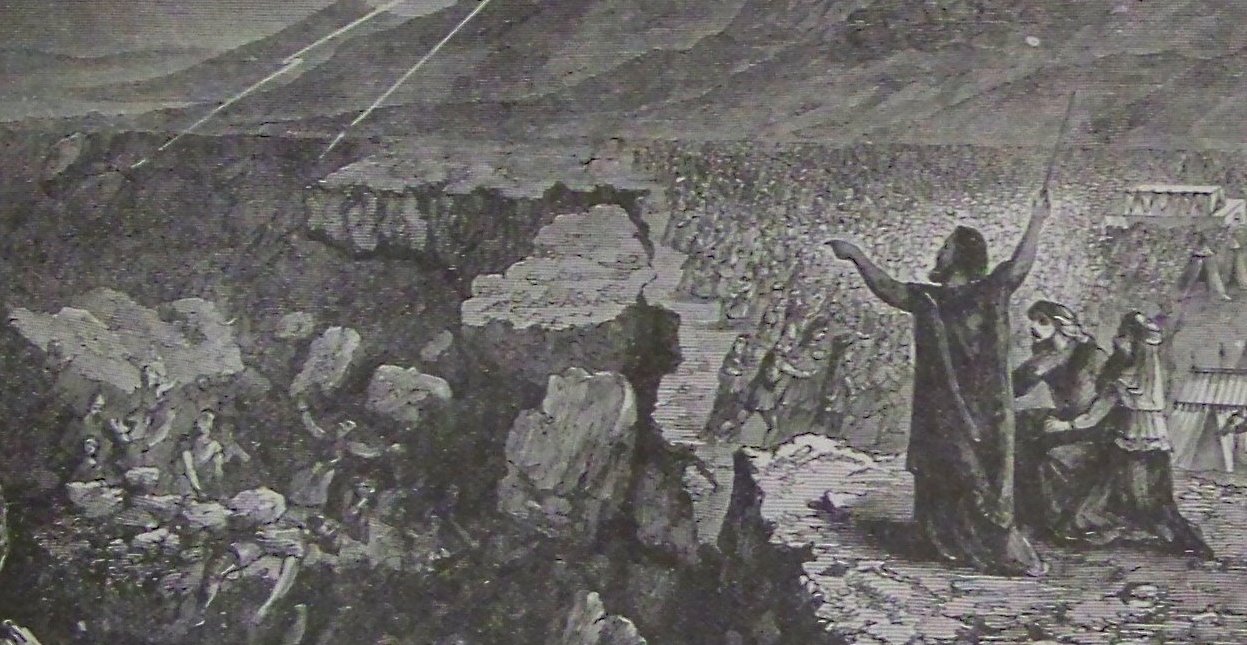Commentary on Parashat Korach, Numbers 16:1-18:32
The morning after Korach, Dotan and Aviram’s ill-fated challenge to Moses and Aaron, the whole of Israel blames the two leaders for the death of the 250 leaders who sided with Korach.
Numbers 17:6-15
But all the Children of Israel grumbled on the morrow against Moses and against Aaron, saying: (It is) you (who) caused the death of YHWH’s [God’s] people! Now it was, when the community assembled against Moses and against Aaron, that they turned toward the Tent of Appointment, and here: the cloud had covered it, and the Glory of YHWH could be seen! Then Moses and Aaron came to the front of the Tent of Appointment. And YHWH spoke to Moses, saying: Move aside from the midst of this community, that I may finish them off in an instant!
They flung themselves upon their faces. Moses said to Aaron: Take (your) pan and place upon it fire from the slaughter site, putting smoking incense (there); go quickly to the community and effect appeasement for them, for the fury is (still) going out from the presence of YHWH, the plague has begun! Aaron took (it), as Moses had spoken, and he ran to the midst of the assembly: and here, the plague had begun among the people! So he put the smoking incense (in it), and effected appeasement for the people: now he stood between the dead and the living, and the plague was held back. Now those that died in the plague were fourteen thousand and seven hundred, aside from those that died in the matter of Korach. Aaron returned to Moses, to the entrance of the Tent of Appointment, and the plague was held back.
Your Torah Navigator
1. Why were the people upset with Moses and Aaron when they knew that God had swallowed them up?

Help us keep Jewish knowledge accessible to millions of people around the world.
Your donation to My Jewish Learning fuels endless journeys of Jewish discovery. With your help, My Jewish Learning can continue to provide nonstop opportunities for learning, connection and growth.
2. How did Moses know to tell Aaron that incense was needed to effect an appeasement?
3. What does it mean that Aaron “stood” between the dead and the living?
Rashi on the verse “now he (Aaron) stood between the dead and the living:”
Aaron grabbed the Angel of Death and held him back against his will. The angel said to him: Leave me to fulfill my mission. Aaron replied: Moses ordered me to detain you. The angel answered: I am a messenger of God and you are only a messenger of Moses. Aaron answered: Moses never does anything on his own, all his orders come from the Mighty One. If you don’t believe me the Holy One and Moses are both at the Tent of Appointment right now. Come with me and ask them. That is why the following verse says, “And Aaron returned to Moses, to the entrance of the Tent of Appointment and the plague was held back.”
A Word
Rabbi Naftali Tzvi Berlin, known by the acronym the “Netziv,” on his famous super-commentary on Rashi and the said that the people found the slaughter of the 250 excessive. Moses and Aaron could have limited the trial to Korach, Dotan and Aviram, and once the earth had swallowed them up, the others would have repented. The Netziv points out that Moses and Aaron were not the ultimate designers of the trial, but it was Moses acting on the Divine Spirit.
Rashi understands that when the verse says, “Now he stood between the dead and the living,” Aaron was literally standing between the Angel of Death and those whom the angel wished to destroy. He holds the angel back with the incense that protected Moses from being swallowed up as Korach’s minions were destroyed. The angel wants haron to leave so he can finish his job, but Aaron convinces the angel to return to the tent with him and the plague is stopped.
Just as lack of fear and belief in God’s power brings destruction, so does belief in God’s instruments and reverence for God’s might bring healing and mercy. The people were not worthy, but Aaron, the worthy advocate, stopped death in its tracks and brought yet another reprieve on a recalcitrant people. Even after he had been compromised by the Golden Calf, Aaron is willing to look death straight in the eye to save a community who would most probably not return the favor.
Reprinted with permission from Hillel: The Foundation for Jewish Campus Life.
Aharon
Pronounced: ah-ha-RONE, Origin: Hebrew, Aaron in the Torah, brother of Moses.

Help us keep Jewish knowledge accessible to millions of people around the world.
Your donation to My Jewish Learning fuels endless journeys of Jewish discovery. With your help, My Jewish Learning can continue to provide nonstop opportunities for learning, connection and growth.
Moshe
Pronounced: moe-SHEH, Origin: Hebrew, Moses, whom God chooses to lead the Jews out of Egypt.

Help us keep Jewish knowledge accessible to millions of people around the world.
Your donation to My Jewish Learning fuels endless journeys of Jewish discovery. With your help, My Jewish Learning can continue to provide nonstop opportunities for learning, connection and growth.



